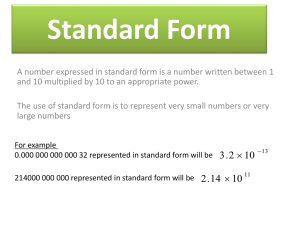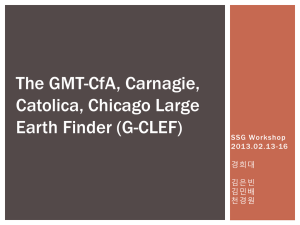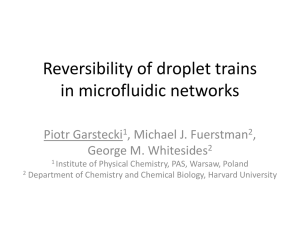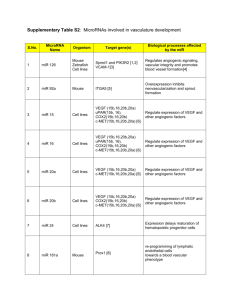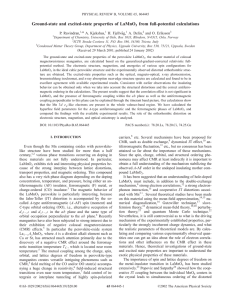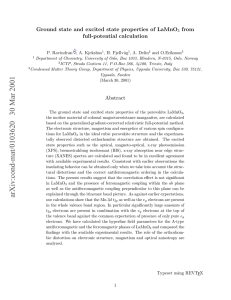LaMnO$_3 - The new generation in strongly correlated electron
advertisement
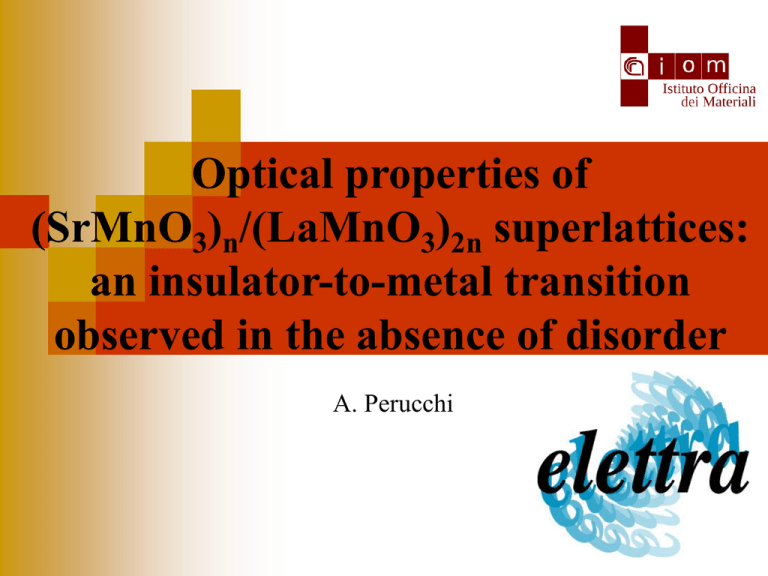
Optical properties of
(SrMnO3)n/(LaMnO3)2n superlattices:
an insulator-to-metal transition
observed in the absence of disorder
A. Perucchi
SISSI, the IR beamline of the ELETTRA Storage Ring
Synchrotron Infrared Source for Spectroscopy and Imaging
SISSI - Solid State Physics activities
Electrodynamics at High Pressures
Insulator to Metal Transitions
(VO2, V2O3, V3O5, NiS2, etc.)
Charge-Density-Waves
(CeTe3, LaTe2)
Superconductivity
(BaFe2As2)
THz Superconducting Gaps
(MgB2, V3Si, Ba(Fe,Co)2As2)
Optical Properties of (LaMnO3)2n/(SrMnO3)n
•L. Baldassarre
•S. Lupi
•P. Calvani
•A. Nucara
•L. Maritato
•P. Orgiani
•D.G. Schlom
•C. Adamo
Outline
• Basic concepts on Manganites
Double-Exchange, Jahn-Teller polarons, optical conductivity
• (LMO)2n/(SMO)n SuperLattices (SL)
• Optical properties of n=1 compound
Understanding the role of disorder in LSMO alloys
• Optical properties of large period SLs
Appearance of novel “bulk” electronic states
Colossal Magnetoresistance (CMR)
manganites
(H) (0)
MR
(0)
10 2
O
Mn
R,A
R1-xAxMnO3
P. Schiffer, Phys. Rev. Lett. 75, 3336 (1995)
Electronic Structure and Phase Diagram
Mn3+
Jahn-Teller
LaMnO3
(Mn3+)
Y. Tokura, Rep. Prog. Phys 69, 797 (2006).
SrMnO3
(Mn4+)
CMR Models
Double-Exchange model
C Zener, Phys Rev 82, 403 (1951); PW Anderson and H Hasegawa, Phys Rev 100, 675 (1955)
t ij bij cos
ij
2
Phys Rev Lett 74, 5144 (1995)
DE explains the PI-FM transition, but fails in predicting
• the right Curie temperature (TcDE~103 K vs TcExp~102 K)
• the resistivity values (above Tc: DE~10-3 .cm vs Exp~10-2 .cm )
Double-Exchange + Jahn-Teller polarons
CMR and Phase Separation
Zhang et al., Science 298, 805 (2002)
Phase Separation as an
essential CMR ingredient
Role of disorder as a source
of nucleation centers
see Poster from
A. Pineiro on Tuesday
Sarma et al., Phys Rev 93, 097202 (2004)
Dagotto, New J Phys 7, 67 (2005)
Optical conductivity
NORMAL METAL
1 ( .cm) -1
6000
p
2
4000
4Ne 2
mb
“BAD” METAL
(Strongly correlated metals,
Polaronic metals, etc.)
2000
0
0
10
20
30
-1
Frequency (cm
40
50x10
MIR bands indicate that a localization
mechanism (mass enhancement) is at play
3
)
Tot 2
p
Drude 2
p
4 Ne 2
m*
m * /m b
MIR 2
p
4Ne 2
mb
Tot
p
2
Drude
p
1 ( .cm)
Drude 2
p
-1
6000
MIR band
4000
2000
0
0
10
20
30
2
Frequency (cm
40
-1
)
50x10
3
LSMO optical properties
La0.825Sr0.175MnO3 cleaved
single crystal
Takenaka et al., Phys. Rev B 60, 13011 (1999)
40 nm La2/3Sr1/3MnO3 on STO
Haghiri-Gosnet et al., Phys. Rev B 78, 115118 (2008)
Interfaces and Superlattices
Designing materials with novel electronic
states at the interface between two different
oxides as in (LAO/STO), (LTO/LAO), etc.
Addressing CMR and the physics of DE in
the absence of substitutional disorder.
The (LMO)2n/(SMO)n SL series mimics the
doping content of La2/3Sr1/3MnO3 alloys
Smadici et al., 2007
Tuning the MIT in (LaMnO3)2n/(SrMnO3)n
A peak in the resistivity is always found at the Curie Temperature!!!
Double-Exchange physics
Adamo PRB 2009
Optical reflectivity of 20 nm (LMO)2n/(SMO)n on STO
1.0
n=1
0.8
10 K
400 K
SrTiO3
0.6
0.4
0.2
0.0
0
500
1000
Frequency (cm
-1
1500
)
IR
I0
R=IR/I0
2000
Optical properties of the multilayer
vacuum (n=1, k=0)
sample (n, k)
STO substrate (nSTO, kSTO)
vacuum (n=1, k=0)
r ij
ni n j
r1234
ni n j
2n j
t1234
ni n j
p p i p dp /2 2d p (n p ik p ) / 0
1 r12 r 23 exp{2i2 } r 23 r 34 exp{2i3} r12 r 34 exp{2i(2 3 )}
r12 r 23 exp{2i2 } r 34 exp{2i(2 3 )} r12 r 23 r 34 exp{2i3}
t ij
t12 t 23 t 34 exp{2i(2 3 )}
1 r12 r 23 exp{2i2 } r 23 r 34 exp{2i3} r12 r 34 exp{2i(2 3 )}
The Lorentz-Drude model
j
2pD
4N j e 2
1
() 1 2
i D j
m ( j 2 2 ) i j
1
pj
~
j
1 n 2 k 2,
2 2nk
~
N ( )
i (1 )
4
~
~
1
2
,
4
2 (1 1 )
4
0.8
0.8
0.6
0.6
R()
R()
Data fitting
0.4
0.4
0.2
0.2
0.0
0
2000
4000
6000
Frequency (cm
14x10
-1
0.0
8000
0
15
20
Frequency (cm
3
14x10
25
-1
30
35x 10
3
)
3
12
10
8
-1
10 K
400 K
1 ( cm)
-1
10
)
12
1 ( cm)
5
6
10
10 K
400 K
8
6
4
4
2
2
0
0
0
2000
4000
Frequency (cm
-1
6000
)
8000
0
5
10
15
20
Frequency (cm
-1
25
)
30
35x10
3
(LMO)2/(SMO)1 parameters
14x 10
3
12
-1
10
1 ( cm)
Hartinger et al.
(2004)
•1 Drude term
•1 MIR band
•2 T-independent HOs
10 K
400 K
8
6
4
2
0
2000
4000
Frequency (cm
-1
6000
8000
2.0x10
21
8000
)
(cm )
0
p
Tot 2
m * /mb
Drude 2
p
N N MIR
D
7
ND
-1
MIR
0.5
2000
0.0
10x10
-3
N Mn 7 1021 cm3 if
mb 0.5me
4000
0
with
1.0
6000
0
6
21
4
2
8
(·cm)
N 1/3 N Mn
-3
me
N D N MIR 5 1021 cm3
mb
NMIR ( cm )
N
ND ( cm )
1.5
6
4
2
10
-3
6
4
2
10
-4
6
4
0
2
0
100
200
300
Temperature (K)
400
0
100
200
300
Temperature (K)
400
Comparing n=1 SL with alloys
AP et al., Nano Letters 10, 4819 (2010)
8000
1.
2.
3.
4.
5.
10 K
400 K
1 ( cm)
-1
6000
The electronic properties of
(LMO)2/(SMO)1 SL are fully
equivalent to those of the
corresponding La2/3Sr1/3MnO3
La2/3 Sr1/3 MnO3
La0.825 Sr0.175 MnO3
4000
dc conductivity ~ 104 .cm
Tcurie ~ 350 K
m*/mb ~ 7
MIR band softening
edge in1 at ~ 1000 cm-1
2000
0
0
2000
4000
Frequency (cm
6000
-1
)
8000
Adamo PRB 2009
• The n=1 SL has homogeneous electronic density
• Disorder probably plays a very limited role in the corresponding LSMO alloy
Reflectivity of n=1,3,5 and 8 compounds
1.0
n=8
n=5
n=3
n=1
0.5
R()
1.0
T=10 K
SrTiO3
n=8
n=5
10 K
200 K
300 K
400 K
0.5
1.0
n=1
n=3
0.5
0.0
0
400
800
1200
0
Frequency (cm
400
-1
)
800
1200
AP et al., Nano Letters 10, 4819 (2010)
Optical conductivity
4000
2000
n=8
T=10 K
1000
0
3000
1000
n=5
-1
0
2000
1 ( cm)
1 ( cm)
-1
n=8
n=5
n=3
n=1
n=3
1000
0
n=1
10 K
200
300
400
3000
1000
2000
1000
0
0
0
4000
8000
12000
Frequency (cm
-1
)
16000
0
2000
4000
6000
Frequency (cm
-1
8000
)
AP et al., Nano Letters 10, 4819 (2010)
(LMO)2n/(SMO)n parameters
12x10
3
10
a
d
-1
(cm )
10
n=8
10
10
MIR
6
0
4
10
The overall free carrier spectral
weight diminishes with n
e
2.0x10
10
-3
10
10
1.0
f
n=3
0.5
NMIR ( cm )
10
10
0.0
10x10
10
21
8
g
6
0
n=1
10
10
4
2
10
-1
-2
-3
-1
(·cm)
n=8
n=5
n=3
n=1
1.5
-3
n=5
21
b
-2
10
0
ND ( cm )
-1
8
2
-3
0
The agreement between resistivity
measurements and dc conductivity
worsens with increasing n:
Role of perpendicular paths in the
resistivity
-2
-3
-2
-3
-4
c
0
0
100
200
300
Temperature (K)
400
0
100
200
300
400
Temperature (K)
500
Dong et al. (2008)
Large period SLs, end-members, and alloys
2000
T=10 K
1 ( cm)
-1
1500
n=16
n=8
LaMnO3
La0.9 Sr0.1 MnO3
SrMnO3
Adamo PRB 2009
1000
SrMnO3
In site Mn4+ transitions:
t2g-eg
500
0
La1-xSrxMnO3
0
Mn3+ to Mn4+ transitions:
1/2 Jahn-Teller
5000
10000
15000
Frequency (cm
-1
20000
)
25000
LaMnO3
In site Mn3+ transitions:
eg-eg (Jahn-Teller)
The presence of a mid-IR band signals mixed Mn valencies.
Its sizable spectral weight can not be attributed to interfacial Mn3+-Mn4+ transitions alone
AP et al., Nano Letters 10, 4819 (2010)
Conclusions
1. Homogeneous electronic state for short period SLs
2. Similarities between n=1 SL and corresponding alloy
(reduced role for disorder)
3. Optical characterization of the Metal to Insulator
transition with increasing n
4. Novel “bulk” (not limited to interface) electronic
states in large period SLs
